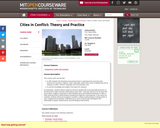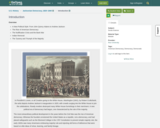
This course's aims are two-fold: 1) to offer students the theoretical and practical tools to understand how and why cities become torn by ethnic, religious, racial, nationalist, and/or other forms of identity that end up leading to conflict, violence, inequality, and social injustice; and 2) to use this knowledge and insight in the search for solutions. As preparation, students will be required to become familiar with social and political theories of the city and the nation and their relationship to each other. They also will focus on the ways that racial, ethnic, religious, nationalist or other identities grow and manifest themselves in cities or other territorial levels of determination (including the regional or transnational). In the search for remedies, students will be encouraged to consider a variety of policymaking or design points of entry, ranging from the political- institutional (e.g. forms of democratic participation and citizenship) to spatial, infrastructural, and technological interventions.
- Subject:
- Applied Science
- Architecture and Design
- Material Type:
- Full Course
- Provider:
- MIT
- Provider Set:
- MIT OpenCourseWare
- Author:
- Davis, Diane E.
- Date Added:
- 01/01/2003




